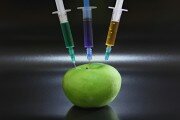The New Toxic Danger In Plastic Products
You’ll find it in CD cases, plastic cutlery, plastic water bottles, ready-meal containers and microwave dinners, and in the lining of tinned food. Bisphenol A or BPA (a synthetic oestrogen) is a toxic chemical used to harden plastics and it is one of the world’s most widely manufactured chemicals, with more than 2.2 million tons made each year.
By now, we all know to avoid BPA. And if you are still not sure why, here are a few reminders: BPA has been linked to the rising numbers of male infertility, increased risk of heart disease, type 2 diabetes and abnormal concentrations of liver enzymes. It is known to cause hormone imbalances and has also been shown to worsen the symptoms of debilitating migraine headaches.
BPA – I’ll have mine without
The UK, European Union (EU) and the US have banned BPA in products like baby bottles and whenever you go shopping these days you’ll see big stickers on almost everything plastic saying “BPA FREE!”
There’s no doubt that Joe Public’s awareness of BPA’s dangers has made a dent in the profits of plastic manufacturers who must’ve seen a drop in sales of water bottles, baby bottles, sippy cups and food containers. This is most likely the reason why they moved fast to replace BPA with a new chemical: bisphenol-S (BPS).
If BPS sounds like the nasty cousin of BPA, then you are right. BPS has a similar structure to BPA, and therefore is likely to have a similar negative impact on the human body. More troubling, is the fact that research suggests BPS is significantly less biodegradable and it’s more heat-stable and photo-resistant than BPA.
BPS’ relative inability to biodegrade means that once it is absorbed into the human body, it may accumulate there for longer periods of time. It is also more likely to persist in the environment. In other words, its potential to do harm will worsen along the axis of time, not lessen.
Perhaps the biggest problem is that BPS had not been fully researched by regulators before manufactures started to use it in their products. And if you look at the results of a recent study, then the mind boggles as to how this toxic gunk made it onto our supermarket shelves in the first place.
Recently, researchers at the University of Calgary discovered that even at very, very low doses, BPS causes significant brain damage in the embryos of zebra fish.
Zebra fish, the researchers said, are especially good subjects to study human brain development. And if what they found in these zebra fish babies is even remotely similar to what BPS can do to human babies, we’re in big trouble.
The results of the study found that exposure to BPS at a critical time in zebra fish development can cause the abnormal growth of neurons in their brains. All those extra neurons can translate into childhood hyperactivity and other developmental problems such as autism.
I won’t blame you if you are sceptical about these results – after all, it’s only zebra fish we’re talking about and not human babies.
However, very few studies have so far been done to determine the real dangers of BPS in humans, yet this potential toxic chemical is used in many household products. So these results should not be taken lightly. In fact, I think, they are a smoking gun indicating that there is a chance (no matter how remote) that BPS can contribute to “adverse brain development” in children… something nobody in his or her right mind should want to risk.
It’s obvious that avoiding only BPA isn’t enough. We need to steer clear of all plastics, even the ones that imply they’re safe – and that’s especially true for pregnant women. Here’s how:
- Ditch the plastic water bottles for stainless steel. Some companies are even making glass water bottles wrapped in a kind of “safety” holder.
- Forget the plastic food containers and get some glass ones. They come in all sizes and are even better at keeping food fresh.
- Avoid canned food, since BPS may also be used to replace BPA in cans, even the ones that say ‘”BPA free.” Whenever you can, buy fresh or frozen foods instead.
- And never, ever microwave food in plastic containers.
Did you find this information useful?
Then why not get more expert health recommendations just like this delivered direct to your inbox?
"It is truly refreshing to read a newsletter on the topic of alternative medicine which is scientifically based and reviewed by professionals..." - Robert Sinott
We respect your privacy and will never share your details with anyone else.Disclaimer: Bear in mind the material contained in this article is provided for information purposes only. We are not addressing anyone’s personal situation. Please consult with your own physician before acting on any recommendations contained herein.
Sources:
“Chemical commonly found in plastics makes migraines worse, researchers show” C.J. Janovy, University of Kansas Medical Center, 11/12/13, kumc.edu
“What is BPA, and what are the concerns about BPA?” Katherine Zeratsky, R.D., L.D., Mayo Clinic, mayoclinic.com
Infertility causes due to BPA, published online, myfertileground.com
‘Gender bending’ chemical in food tins may cut male fertility, published online 05.08.10, dailymail.co.uk
“Popular ‘BPA-free’ chemical causes brain damage, study finds,” Leah Zerbe, January 13, 2015, Rodale News, rodalenews.com










